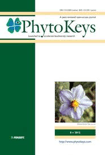
PhytoKeys
metrics 2024
Innovating knowledge in plant taxonomy and conservation.
Introduction
PhytoKeys is a prominent open-access journal published by PENSOFT PUBLISHERS that has become a vital resource in the fields of Agricultural and Biological Sciences, Ecology, Evolution, Behavior and Systematics, and Plant Science. Since its inception in 2010, PhytoKeys has provided a platform for researchers and scholars to disseminate high-quality botanical research, making it increasingly relevant globally. The journal enjoys a commendable impact factor reflected in its 2023 ranking, positioning it in the Q2 quartile across multiple categories, including the 61st percentile in Agricultural and Biological Sciences (miscellaneous) and the 53rd percentile in Plant Science. With a dedicated editorial board and a mission to advance our understanding of plant diversity, taxonomy, and conservation, PhytoKeys supports the academic community by facilitating accessibility to cutting-edge research. Its commitment to open access ensures that valuable knowledge is readily available to researchers, professionals, and students worldwide, fostering collaboration and innovation in plant sciences.
Metrics 2024
 0.53
0.53 1.30
1.30 1.30
1.30 26
26Metrics History
Rank 2024
Scopus
IF (Web Of Science)
JCI (Web Of Science)
Quartile History
Similar Journals
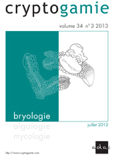
CRYPTOGAMIE BRYOLOGIE
Fostering Innovation in Ecological ResearchCRYPTOGAMIE BRYOLOGIE is a prominent academic journal published by ADAC-CRYPTOGAMIE, focusing on the intricate field of bryology—the study of mosses and other bryophytes. Established in 1999 and continuing its commitment to scholarly excellence through to 2024, this journal serves as a vital platform for researchers, professionals, and students invested in ecosystem dynamics, plant sciences, and evolutionary biology. Recognized for its rigorous peer-review process and notable contributions, CRYPTOGAMIE BRYOLOGIE holds esteemed rankings, with a Q3 categorization in Ecology, Evolution, Behavior and Systematics and Q2 in Plant Science as of 2023. While the journal operates without open access, its articles are essential for advancing knowledge and fostering discussion in the disciplines it serves. Given its strategic position within the Scopus Ranks, where it occupies significant rankings in the domains of Plant Science and Ecology, the journal is poised to influence ongoing research and inspire future studies in the rapidly evolving world of bryophytes.
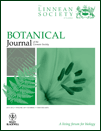
BOTANICAL JOURNAL OF THE LINNEAN SOCIETY
Unveiling the Complexity of Flora and Fauna InteractionsThe Botanical Journal of the Linnean Society, published by Oxford University Press, stands as a premier platform for interdisciplinary research within the realms of Ecology, Evolution, Behavior, and Plant Science. With a notable impact factor reflective of its esteemed reputation, this journal is classified in the Q1 quartile for both Ecology and Plant Science, placing it among the most influential publications in these fields. Since its inception in 1969, and with an anticipated convergence of research extending to 2024, it has become essential for scholars and professionals seeking to engage with cutting-edge studies, theoretical frameworks, and practical applications that drive our understanding of plant biology and ecological systems. The journal’s commitment to excellence is underscored by its robust Scopus rankings—achieving an impressive 83rd percentile in Ecology and a 82nd percentile in Plant Science. This makes the Botanical Journal of the Linnean Society a crucial resource for researchers, educators, and students alike, eager to advance their knowledge and contribute to the evolving discourse in botany and environmental studies.
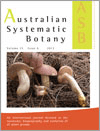
AUSTRALIAN SYSTEMATIC BOTANY
Advancing the Science of Australian FloraAustralian Systematic Botany is a prestigious academic journal dedicated to the field of plant science, published by CSIRO PUBLISHING. Established in 1988, this journal has become a vital resource for researchers, professionals, and students focusing on the systematic study of Australian flora. With an impressive track record and convergence extending to 2024, it operates in the Q3 category for Ecology, Evolution, Behavior and Systematics and Q2 for Plant Science as of 2023. The journal holds significant value in the academic community, given its Scopus ranking, which places it in the 61st and 59th percentiles within its respective categories. Although it follows a subscription-based model, the journal remains committed to advancing knowledge in systematic botany, offering critical insights that shape the future of ecological and biological research both in Australia and globally.
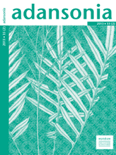
ADANSONIA
Innovating research in the heart of plant biology.ADANSONIA is a distinguished, peer-reviewed open access journal dedicated to advancing the field of plant science. Published by the Publications Scientifiques du Museum in Paris since 2000, this journal serves as a critical platform for sharing innovative research and discoveries in botany, ecology, and related disciplines. With its ISSN 1280-8571 and E-ISSN 1639-4798, ADANSONIA boasts a notable Scopus rank of #383 in the Agricultural and Biological Sciences category and a 2023 category quartile ranking of Q3 in Plant Science, indicating a meaningful contribution to the academic community. The journal's scope encompasses a broad range of topics, making it a vital resource for researchers, professionals, and students alike who are exploring the complexities of plant biology. Based in France, ADANSONIA not only enhances visibility for groundbreaking research but also facilitates open communication amongst scholars, ensuring that knowledge on plant science is accessible worldwide. Located at CP 39-57, Rue Cuvier, F-75231 Paris Cedex 05, France, this journal stands as a testament to the collaborative efforts in the pursuit of scientific excellence in plant sciences.

ACTA SOCIETATIS BOTANICORUM POLONIAE
Exploring the Depths of Botanical Knowledge Since 1923ACTA SOCIETATIS BOTANICORUM POLONIAE is a reputable open-access journal dedicated to the field of Plant Science, published by the Polskie Towarzystwo Botaniczne since 1923. With an ISSN of 0001-6977 and an E-ISSN of 2083-9480, this journal has made significant contributions to the botanical sciences, fostering the dissemination of research from Poland and beyond. The journal has ranked in the third quartile (Q3) within its category in the 2023 journal metrics, demonstrating a strong presence in the global academic community, as evidenced by its Scopus ranking of 291/516 within the Agricultural and Biological Sciences sector, placing it in the 43rd percentile. While specific H-Index data are currently not available, ACTA continues to attract submissions from a broad international audience and publishes a wide range of studies that advance the understanding of plant biology, ecology, and conservation. The journal remains a vital resource for researchers, professionals, and students alike, committed to enhancing knowledge and collaboration in botanical science.

BRITTONIA
Exploring the Richness of Botany and EcologyBRITTONIA, published by Springer, stands as a reputable journal dedicated to advancing the fields of botany and plant sciences. With a storied history dating back to 1931, this journal has evolved to embrace contemporary research spanning various aspects of plant biology, ecology, and systematics. Focusing on a comprehensive analysis of both ecological interactions and plant systematics, BRITTONIA plays a crucial role in disseminating knowledge among researchers and professionals committed to understanding plant life and its environmental contexts. Despite its open access status being currently unavailable, the journal ensures wide accessibility through institutional subscriptions. In the latest rankings, it proudly holds a Q2 category in Plant Science and a Q3 category in Ecology, Evolution, Behavior, and Systematics, indicating its growing influence and academic rigor. Researchers and students alike will find BRITTONIA an essential resource for the latest findings and discussions in plant sciences.
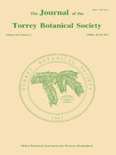
JOURNAL OF THE TORREY BOTANICAL SOCIETY
Unlocking the secrets of the natural world through botanical insights.JOURNAL OF THE TORREY BOTANICAL SOCIETY is a prominent academic journal dedicated to advancing the fields of botany and ecology, published by the esteemed TORREY BOTANICAL SOCIETY. With an ISSN of 1095-5674 and an E-ISSN of 1940-0616, this journal serves as a critical platform for researchers, professionals, and students to share their findings and insights. Despite its status in the Q4 category for the 2023 rankings across Ecology, Plant Science, and Ecology, Evolution, Behavior and Systematics, the journal continues to foster significant discourse and collaboration in the botanical sciences, aiming to elevate the understanding of plant biology and ecosystems. Its open access options enhance accessibility, ensuring that groundbreaking research reaches a wider audience. Published in the United States, the journal features work from both established scientists and emerging scholars, making it a vital resource for anyone involved in the study of plants and their environmental interactions. Explore the JOURNAL OF THE TORREY BOTANICAL SOCIETY to engage with cutting-edge research and contribute to the ongoing dialogue in the botanical sciences.
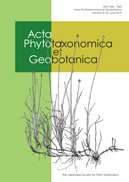
Acta Phytotaxonomica et Geobotanica
Fostering Knowledge in Plant Systematics and GeographyActa Phytotaxonomica et Geobotanica, published by the Japanese Society for Plant Systematics at the University of Tokyo, serves as a vital platform for advancing research in the fields of ecology, plant science, and biodiversity. With an ISSN of 1346-7565 and an E-ISSN of 2189-7042, this journal not only provides a comprehensive evaluation of current topics within these categories but also addresses the intricate connections between plant systems and their ecological environments. Although currently not open access, the journal is essential for researchers aiming to publish cutting-edge findings, contributing significantly to its classification within the Q3 quartile across multiple disciplines, including Ecology and Plant Science. With an ambitious focus on enhancing the understanding of plant taxonomy and geography through a convergence of research periods from 2014 to 2024, Acta Phytotaxonomica et Geobotanica plays a pivotal role in fostering academic discourse and innovation in plant systematics. Its geographical foundation in Japan enriches the journal's unique perspective on regional flora, making it an indispensable resource for students, researchers, and professionals in the field.

PLANT SYSTEMATICS AND EVOLUTION
Transforming Understanding of Plant LineagesPlant Systematics and Evolution is a prestigious journal published by Springer Wien, dedicated to advancing research within the fields of plant taxonomy, evolution, and ecology. With its ISSN 0378-2697 and E-ISSN 1615-6110, this journal has been pivotal in shaping the scientific landscape since its inception in 1974. Based in Austria, it occupies a significant position in the academic community, being ranked in the Q2 quartile in both Ecology, Evolution, Behavior and Systematics and Plant Science as of 2023. This high-impact journal is recognized for its rigorous peer-review process and is indexed among the top publications in its category, holding a Scopus rank of #176 out of 516 in Plant Science and #252 out of 721 in Ecology, highlighting its relevance and quality in the research community. Although it does not currently offer open access, the journal is committed to making significant contributions to the understanding of plant biodiversity and evolutionary processes. This makes it an essential resource for researchers, professionals, and students aiming to know the latest developments in the study of plant systematics and evolution.

Bangladesh Journal of Plant Taxonomy
Championing open access to plant biodiversity insights.Welcome to the Bangladesh Journal of Plant Taxonomy, a leading open-access publication dedicated to advancing the understanding of plant taxonomy in the context of Bangladesh's rich biodiversity. Published by the Bangladesh Association of Plant Taxonomists, this journal plays a crucial role in fostering academic discourse and dissemination of research findings since its establishment. With its ISSN 1028-2092 and E-ISSN 2224-7297, the journal provides a platform for researchers, professionals, and students to share their contributions to plant science. Although it has discontinued its coverage in Scopus from 2018, it remains a valuable resource, evidenced by its rankings in the agricultural and biological sciences categories, including a placement of #330/403 in Plant Science and #515/588 in Ecology, Evolution, Behavior, and Systematics. Open access since 2005, the journal ensures that critical research is freely available to all, supporting the global community in the study and preservation of plant biodiversity.